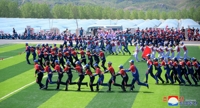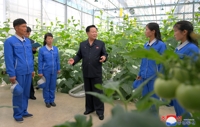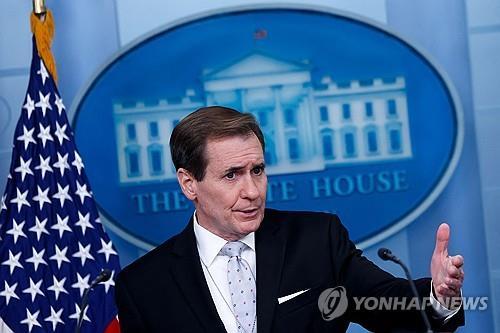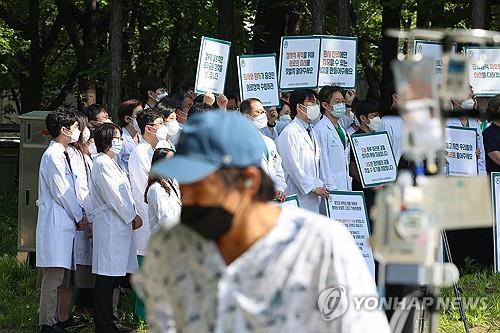Today in Korean history
June 26
1949 -- Kim Koo, one of the nation's most revered patriots, is assassinated by an ultra-right-wing military officer. Seeing the nation sharply divided between the right and the left soon after the 1945 independence from Japanese colonial rule, Kim made his utmost efforts to mediate and promote a unified Korea. However, Korea, divided into separate states the previous year, was going through tumultuous conflicts between pro-U.S. capitalists and communists supported by the Soviet Union.
A majority of students and progressive scholars supported Kim, but he also faced fierce opposition from right-wing politicians and businessmen. Kim, who was a key leader of the provisional Korean government-in-exile in China under Japanese colonial rule, played a pivotal role in the country's independence movement.
1950 -- The U.N. Security Council holds an emergency meeting and passes a resolution to dispatch troops to South Korea to fight invading North Korean forces. The Korean War had started the previous day, causing many people to flee southward.
The North Koreans easily advanced south at the beginning of the conflict, but the U.N. forces pushed them back to the border with China, where large numbers of Chinese troops intervened to help North Korea.
The fighting ended with a cease-fire, not a peace treaty, on July 27, 1953, meaning the Koreas are still technically at war.
1974 -- South Korea and the United States sign an agreement to cooperate on civil uses of atomic energy.
2000 -- The National Assembly begins its first-ever confirmation hearing for Prime Minister nominee Lee Han-dong. After its two-day hearing, the parliament voted 139-130 to approve Lee's appointment.
2001 -- A North Korean teenager, Chang Kil-su (an alias), and his six relatives make their way into the Beijing office of the United Nations High Commissioner for Refugees, seeking asylum in South Korea. They were allowed to leave China three days later. They arrived in South Korea on June 30 the same year.
2008 -- North Korea hands over a list detailing its plutonium activity to China, following the aid-for-denuclearization deal signed in 2007.
2012 -- South Korea and Colombia conclude free trade talks in Bogota.
2014 -- President Park Geun-hye retains Prime Minister Chung Hong-won two days after her second choice, former conservative journalist Moon Chang-keuk, withdraws his nomination amid mounting criticism of his alleged pro-Japanese views.
2018 -- Two Koreas agree to launch a joint study on the modernization of their railways in preparation for reconnecting them across their heavily fortified border, a legacy of a historic summit between South Korean President Moon Jae-in and North Korean leader Kim Jong-un, held in April 27 the same year.
2019 -- The Seoul High Court upholds a lower court's ruling ordering Nippon Steel Corp. to compensate seven South Koreans for their wartime forced labor and unpaid work. The ruling was also in accordance with a similar one made a year earlier by the Supreme Court that ordered the company to compensate four Korean victims of forced labor during the colonial rule.
(END)
-
 BTS' RM to prerelease a track of 2nd solo album
BTS' RM to prerelease a track of 2nd solo album -
 BTS' Jungkook's 'Seven' chosen as hottest hit outside U.S.
BTS' Jungkook's 'Seven' chosen as hottest hit outside U.S. -
 From pastime to academic discipline: Exhibition spotlights evolution of Korean embroidery
From pastime to academic discipline: Exhibition spotlights evolution of Korean embroidery -
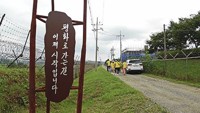 Gov't to open 10 trails near DMZ for visitors next month
Gov't to open 10 trails near DMZ for visitors next month -
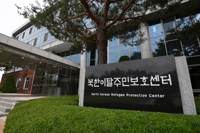 Number of N. Korean defectors entering S. Korea reaches 43 in Q1
Number of N. Korean defectors entering S. Korea reaches 43 in Q1
-
 From pastime to academic discipline: Exhibition spotlights evolution of Korean embroidery
From pastime to academic discipline: Exhibition spotlights evolution of Korean embroidery -
 BTS' RM to prerelease a track of 2nd solo album
BTS' RM to prerelease a track of 2nd solo album -
 BTS' Jungkook's 'Seven' chosen as hottest hit outside U.S.
BTS' Jungkook's 'Seven' chosen as hottest hit outside U.S. -
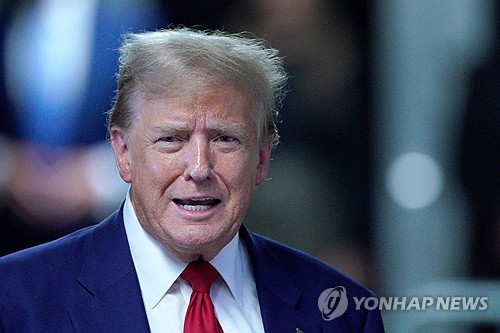 Trump suggests U.S. could withdraw its troops if S. Korea does not contribute more to support USFK: TIME
Trump suggests U.S. could withdraw its troops if S. Korea does not contribute more to support USFK: TIME -
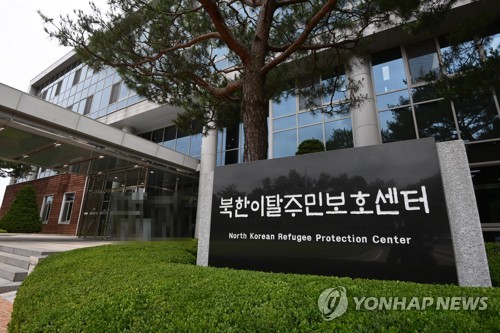 Number of N. Korean defectors entering S. Korea reaches 43 in Q1
Number of N. Korean defectors entering S. Korea reaches 43 in Q1
-
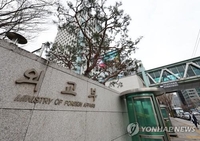 Anti-terrorism alert raised for 5 overseas S. Korean diplomatic missions
Anti-terrorism alert raised for 5 overseas S. Korean diplomatic missions -
 Hybe's sublabel head demanded unilateral contract termination authority for NewJeans: sources
Hybe's sublabel head demanded unilateral contract termination authority for NewJeans: sources -
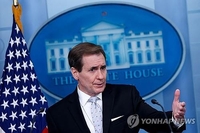 (3rd LD) Russia sent more than 165,000 barrels of refined petroleum to N. Korea in March: White House
(3rd LD) Russia sent more than 165,000 barrels of refined petroleum to N. Korea in March: White House -
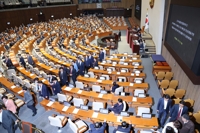 (2nd LD) Opposition-controlled National Assembly passes bill on special counsel probe over Marine's death
(2nd LD) Opposition-controlled National Assembly passes bill on special counsel probe over Marine's death -
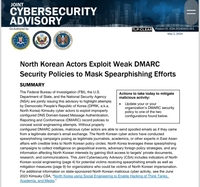 U.S. releases new cybersecurity advisory against N.K.-linked cyber incursion group
U.S. releases new cybersecurity advisory against N.K.-linked cyber incursion group


















